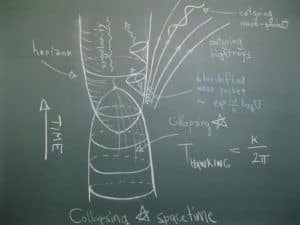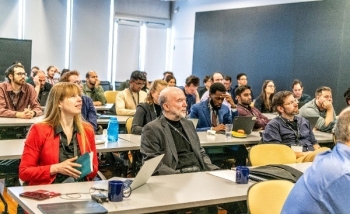The satellite is the brainchild of a team of researchers, including Perimeter Associate Faculty member Raymond Laflamme, Perimeter Affiliate researcher Thomas Jennewein, and many collaborators from Perimeter’s sister institute, the Institute for Quantum Computing (IQC).
The satellite is one of two small satellites green-lighted for development by Waterloo Region researchers. The Federal Economic Development Agency for Southern Ontario (FedDev Ontario) announced $6.4 million in funding for the two projects on February 21.
The IQC satellite will be a microsatellite, meaning that it will be about the size of a box of files and relatively cheap and easy to launch. The satellite’s function will be to perform various optical experiments which will directly test quantum theory. It may seem redundant to test quantum theory.
After all, quantum mechanics is the most thoroughly tested theory in physics. Its stunning precision predicts many properties of fundamental particles to an accuracy of one part in a trillion. And yet, quantum mechanics has never been tested at scales longer than a hundred-odd kilometres. It’s also never been tested in a varying gravitational field. A satellite exchanging signals with a station on the ground would change both those things.
These tests are especially important because we know that quantum mechanics is incomplete, in the sense that it is not yet unified with the theory of gravitation, general relativity. At larger length scales and in varying gravitational fields, one might see interactions between gravity and quantum mechanics. If so, a satellite-based platform may prove ideal for measuring the effects of such interactions, or at least putting an upper bound on how strong its effects might be.
The experiments might even be able to distinguish between competing theories of how gravity and quantum mechanics interact. The satellite experiments have implications for quantum computing as well. Quantum mechanics is often thought of as governing the world of the small; at everyday scales, quantum effects smooth out and become invisible, and it is as if we live in a classical world. What quantum information has taught us is that “quantum = small” is not quite right.
We’ve learned instead that quantum effects show up in systems that are isolated from their surroundings. When things are small, it is easy to isolate them, but it should in principle be possible to build an isolated system that’s large. Building a large system that exhibits quantum effects is one of the challenges we need to overcome to build a quantum computer. Building a large quantum system in the form of an earth-to-satellite network would, therefore, not only be a step toward proving that quantum mechanics are valid at large scales, but also serve as an important demonstration that practical-sized quantum computers are possible.
The satellite will be developed by a team of academic researchers and private partners, coordinated by Communitech, a local technology association. Any launch is still some years away.
Further exploration
About PI
Perimeter Institute is the world’s largest research hub devoted to theoretical physics. The independent Institute was founded in 1999 to foster breakthroughs in the fundamental understanding of our universe, from the smallest particles to the entire cosmos. Research at Perimeter is motivated by the understanding that fundamental science advances human knowledge and catalyzes innovation, and that today’s theoretical physics is tomorrow’s technology. Located in the Region of Waterloo, the not-for-profit Institute is a unique public-private endeavour, including the Governments of Ontario and Canada, that enables cutting-edge research, trains the next generation of scientific pioneers, and shares the power of physics through award-winning educational outreach and public engagement.
You might be interested in



